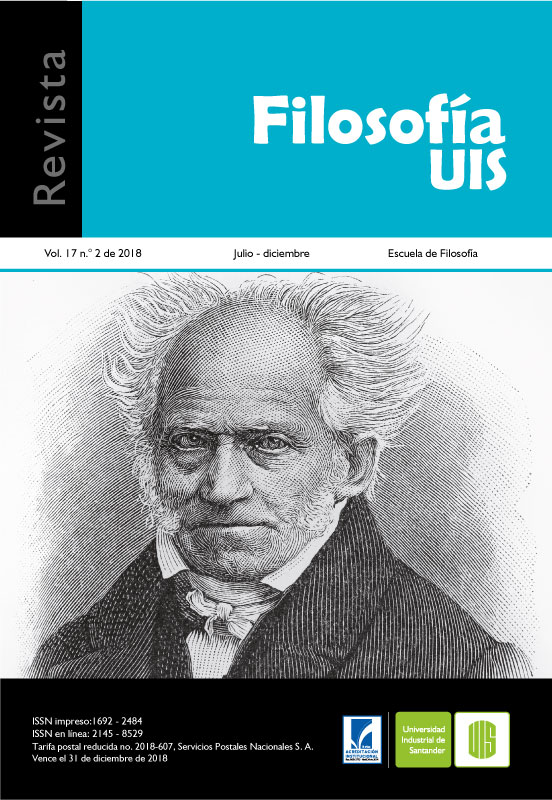Reflections on the concept of citizen participation: Aristotelian and neoaristotelian considerations
Published 2018-07-31
Keywords
- citizen participation,
- Aristotle,
- neoaristotelism,
- Dewey,
- city
- justice ...More
How to Cite
Copyright (c) 2018 Revista Filosofía UIS

This work is licensed under a Creative Commons Attribution 4.0 International License.
Abstract
This article aims to analyze the concept of “citizen participation” from the classical perspective of Aristotle and the modern view of John Dewey taking into account the sociological dynamics of the contemporary era. For that, there will be a critical review of the historical-conceptual scaffolding proposed by Aristotle in the framework of the Athenian’s Constitution and the understanding of the Stagirite of notions such as city, political animal and justice as conceptual inputs connatural to the phenomenon of citizen participation. Afterwards, a general panorama of the contemporary political philosophy will be exposed, highlighting the influence of Aristotle in the current discussions about the concept of citizen participation, especially, the proposal of Dewey as a current alternative to explain the dynamics of citizen participation will be taken into account, as a normative option to improve the political conditions of current societies.
Downloads
References
Arcaya, Ó. (2006). Aristóteles, la justicia política y la democracia deliberativa. Estudios Públicos, (102), 5-26.
Aristóteles (1984). La Constitución de Atenas. Madrid: Editorial Gredos.
Aristóteles (1988). Política. Madrid: Editorial Gredos.
Aristóteles (2011). Ética a Nicómaco. Madrid: Alianza Editorial.
Dewey, J. (1960). Experiencia y Educación. Buenos Aires: Losada.
García Cataldo, H. (2006). La Constitución de Atenas de Aristóteles: Visión retrospectiva de la historia y de la institucionalidad helenas (Tesis de maestría). Universidad de Chile, Santiago de Chile.
Habermas, J. (2002). Acción comunicativa y razón sin transcendencia. Barcelona: Paidós.
Honnet, A. (1999). La democracia como cooperación reflexiva. John Dewey y la teoría de la democracia del presente. Estudios Políticos, (15), 81-106.
Miller, F. (2009). Aristotle on the Ideal Constitution. En Anagnostopoulos Georgios (Ed.), A Companion to Aristotle. EE.UU.: Wiley-Blackwell.
Nussbaum, M. (1996). La calidad de vida. México: Fondo de Cultura Económica.
Nussbaum, M. (2007). Las fronteras de la justicia: consideraciones sobre la exclusión. Barcelona: Paidós.
Reeve, C. (2009). The Naturalness of the Polis in Aristotles. En Anagnostopoulos Georgios (Ed.), A Companion to Aristotle. EE.UU.: Wiley-Blackwell.
Rodríguez Alba, J. (2013). Reseña bibliográfica. Ética para la ciudadanía, Óscar Diego Bautista. Frontera norte, 26(3), 149-152.
Rojas Osorio, C. (2016). La plenitud de la vida: valoraciones éticas y bioéticas. Humacao: Editado por el autor.
Rorty, R. (1998). Pragmatismo y política. Barcelona: Paidós.
Sen, A. (2010). La idea de la justicia. Bogotá: Taurus.
Tomás de Aquino (1990). Summa teológica. Madrid: Biblioteca de Autores Cristianos.
Vieira, E. (2005). Evolución de las teorías sobre integración en el contexto de las teorías de relaciones internacionales. Papel Político, (18), 235-290.
Weber, M. (1944). Economía y Sociedad. México: Fondo de Cultura Económica.
